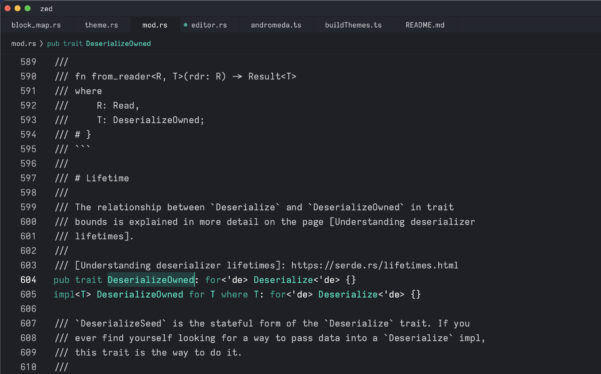Code editors are complex and demanding pieces of software, but from a business standpoint, they’re notoriously difficult to monetize. At the same time, they haven’t kept pace with recent trends like work-from-home collaboration.
At least, that’s how Nathan Sobo sees it. “Coding is inherently social, yet the tools available for talking about code limit the pace and scope of conversations, and this friction is hampering the productivity of our industry,” he told TechCrunch in an email interview. “I believe the only path forward is to integrate collaboration into the authoring environment as a first-class concern, much like the transition that has already occurred in design with Figma or in prose with Google Docs.”
Sobo might not be a household name. But he was a member of the Atom editor team at GitHub, which worked on the (now-deprecated) Atom code editor. Now, he’s launching Zed, a code editor focused on “multiplayer” experiences, performance and a streamlined, minimalist design.
Sobo teamed up with Antonio Scandurra and Max Brunsfeld — fellow Atom contributors — to co-launch Zed. Sobo describes Zed as the culmination of a “decade-long” quest to improve the way software is developed.
“In 2019, Antonio and I decided that in order to achieve our vision of building the ultimate code editor and collaboration platform, we needed to start over with a new technical foundation,” Sobo said. “We worked on Zed during nights and weekends until spring of 2021, when we raised a seed round and started Zed Industries, and we’ve been focused on building Zed since.”
Sobo asserts that Zed’s key differentiators are performance, design and multiplayer editing. It’s designed to minimize distractions and “fade into the background” to make it easier to focus on code, Sobo says. And it offers tools intended to make it simpler to invite teammates into a workspace so they can navigate it together.
With Zed, when users join a teammate’s project, they can edit the code as if it’s on their local machine. Users can call another Zed user from the built-in contacts panel or jump to a teammate’s location to follow them around the code. They can also use Zed’s built-in screen-sharing tool to follow someone outside of the platform to view documentation or experiment with an app in development.

Zed’s code editing interface. Image Creditrs: Zed
“Ultimately, Zed is a software collaboration platform disguised as a world-class code editor. Our objective is for Zed to become the standard platform for open source software development and the go-to tool for software teams,” Sobo added.
Even if Zed delivers as great an experience as Sobo claims it does, I wonder whether it’ll be able to break into the crowded market for IDEs. According to Stack Overflow’s 2022 developer survey, Visual Studio Code remains far and away the most popular IDE, with 74.48% of respondents saying that it’s their preferred platform. The second-most-popular choice — IntelliJ — was a distant second, with 27.97% of the votes.
Zed also isn’t the only IDE upstart on the block. There’s Stackblitz, for example, which recently raised $7.9 million to further develop its browser-based IDE.
But investors are buying into the vision, it seems. Zed today closed a $10 million Series A led by Redpoint Ventures with participation from Root Ventures, Matchstick Ventures and V1.VC, as well as angels including Figma’s Dylan Field and GitHub’s Tom Preston Werner. Valuing Zed at $40 million, the fresh cash brings the startup’s total investment to roughly $12.5 million.
Redpoint’s Patrick Chase was especially complimentary. In an email, he said: “Zed’s mission is to allow engineers to get their ideas into code as fast as possible, or as they would say ‘code at the speed of thought.’ This means a lightning fast editor, seamless team collaboration, and much more in the future. No team is better equipped to solve this complex set of problems than the team behind Zed — the current version of Zed is the culmination of nearly two years of focused development but nearly 16 years of obsessing over how to build a better editor.”
Seven-employee Zed plans to make money primarily through a service-based model. It’s currently pre-revenue and launching in beta to start. But Sobo says that during the private alpha, the waiting list grew to as long as 12,000 people and that there are roughly 800 active users coding with Zed each week (through the alpha).
“The pandemic has helped us by accelerating the industry’s shift to remote development. With fewer opportunities to interact in person, software developers are experiencing the limitations of current collaboration technologies more acutely,” Sobo said. “Zed is built for a new way of working in which conversations around code are richer, and interactions are more human and connected. This new way of working accelerates the progress of software development itself. “
Zed raises $10M for a code editor built for collaboration by Kyle Wiggers originally published on TechCrunch
https://techcrunch.com/2023/03/15/zed-code-editor-raises-10m/




